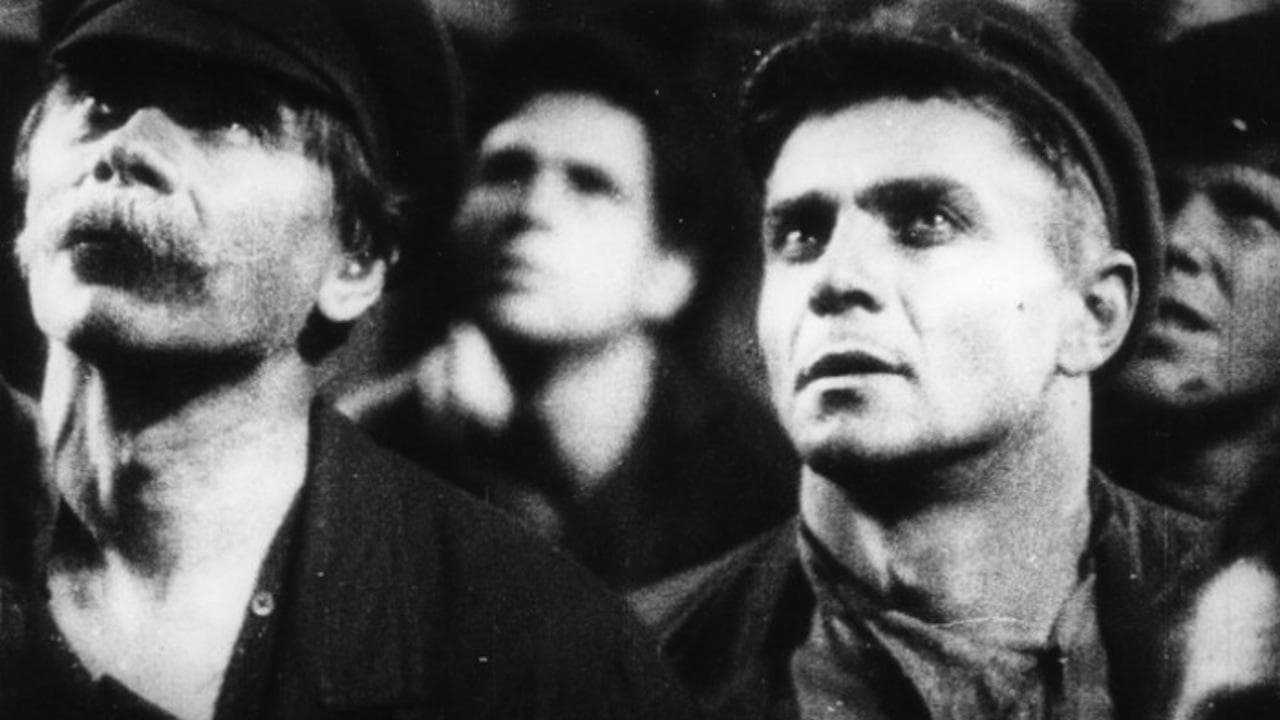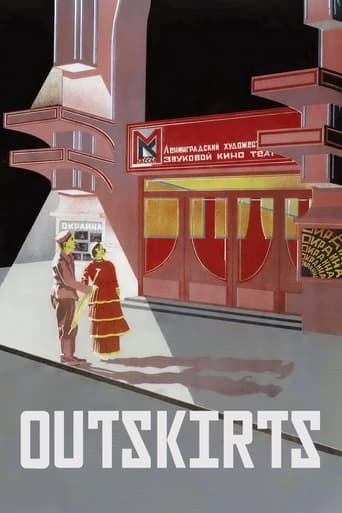

"The Outskirts (Okraina)" follows several stories as villagers in a far-distant Russian town are faced with war, a strike, a prisoner-of-war camp, and the effects and aftershocks these all bring. The town the film begins in is struggling with the shocks and effects of war, and the film follows those effects in multiple story lines. The ways that the war is used vary, from a factory strike brought on by the harshness of the times, to a young woman and her budding relationship with a German prisoner of war, to the shoe factory strike, to the soldiers at the front lines. As with many other Soviet films, there are many semi-leading and leading characters, and these film is constantly shifting between groups of characters and stories we are following. There are also tertiary characters being effected by the war as well. The transition from the more comedic parts to the horrors of war are quick, and often very abrupt. The clumsiness of the story comes from the odd pacing, with too-long bouts of time spent in the various places where the film takes place, making it difficult to transition back to the other story lines easily. The film is clearly struggling to fit the appropriate criteria laid forth by the Soviet Union, to tell the right story with the appropriate characters and the right messages. The stories we follow are compelling in and of themselves but the choppy pacing and the lack of technical finesse detract from the overall quality of this complex, multi-layered war film.
... View MoreThere are a lot of things at work in this film. They're not all necessarily working together, but they're at work. This is often a serious war film, but we still have horses talking and characters winking broadly at the camera for comic effect when need be. Under the umbrella of telling us about of small Russian town (on the "outskirts") during a vital point in history, we end up with a story about a small shoe-factory that may or may not go on strike, one about a German tenant in Russia and his landlord, one about German prisoners of war held in the town and their search for work, and one about a potential romance between one of the soldiers and the landlord's daughter -- and that's before we jump ahead to 1917 for the last twenty minutes. Some of these subplots intertwine in interesting way, but they all cannot. It's filmed with a very striking visual style and filled with memorable images (even occasionally using a visual pun for a scene change), but it still has the early-sound characteristic of moving fairly slowly. That wouldn't be a problem due to the interesting visuals, except that it magnifies the scattered nature of the stories. At its heart, the conflict of the landlord who is caught between affection for his tenant and nationalism turning him against Germans, and later must deal with this again when he catches his daughter with the German prisoner, is a touching one. It also allows for several conflicted and three-dimensional characters in the midst of things. Jumping ahead to the revolution feels out of place and disjointed to this viewer, but perhaps that was mitigated at the time by the fact that for the intended audience of this film, this was a war at home that was well within living memory, and it would have been very directly relevant to them. In all, the film is imposingly made, but doesn't come off all the way due to the fact that its matter is too scattered to make up one story, but not as broad-lens at it would have to be if it wanted completely to be "the story of a town." But it's well worth a watch, both for historical interest and for its commendable camera and direction work.
... View MoreThe remarkable qualities of this early sound film pertain to it's stunning use of sound which is inventive and innovative by any and all standards, the stunning camera movements and long takes. Just as remarkable is the storytelling which plays like a series of short stories and sketches rather than a novella or novel. Yet it doesn't break these short stories into segments or blocks or frame it unlike other attempts at multiple short narratives in a feature.The movement between the various segments and stories is very poetic like from one Greek chorus to another. The central conceit being between the conflict between the war frontlines and the homefront of the village. The scenes of warfare shown in this film is harsh and brutal in a way that anticipates Roberto Rossellini's or Samuel Fuller's later films.What makes it even more harsh is the sense of futility in the conflict. As the infantrymen who fight each other in the trenches have more in common than either would do with their civilian countryman, anticipating Renoir's La Grande Illusion. One breathtaking scene is when one Russian soldier saves a German from getting bombed and then tells him after their initial celebration that he'll be their prisoner now.Equally moving is the tender love story between a Russian girl Anka and a German POW given permission to work in the village. This love story is made possible because Anka's father's friend Robert Karlovish, a German taught her enough about his country to escape the xenophobia of that community at war. Also interesting is the sense of homoeroticism, neither vulgar nor campy, among the various male characters. Early in the film when the soldiers leave for the front there is a wonderful shot of two men kissing each other on the lips which is shown casually without any sense of sensation in the presentation of this scene. Barnet in his film shows that despite the conflict, the violence, the sense of division among his characters(all acted superbly conveying a naturalism absent in many early talkies) there is always a brief glimpse of what things could be or should be.Even if for reasons of propaganda the film ends with the parade of saviour communists, Barnet has managed to create a film that transcends that all the more by ending the film in a shot worthy of Dovzhenko(a key influence on this film) where a character after hearing the arrival of the commmunists, breathes close to death, "What a rush!" and presumably dies off-screen. The world of this film belongs to people, to human relations and not to party lines.
... View MoreI first heard of Boris Barnet at the Telluride Film Festival in the mid-80s-- a rather dour intro by the historian Ian Christie was odd prepararation for two absolutely delightful silent comedies, The Girl With a Hatbox (starring Anna Sten, whom Sam Goldwyn would fail to make into the next Garbo) and The House on Trubnaya Street. Outskirts is Barnet's first sound film, and a darker work, though not as it is often described, purely a serious one.The setting is the year 1914, first in a total backwater (we never know exactly where this town is, or if it's attached to something bigger, it's one town out of a thousand in Tsarist Russia) and then, as war breaks out, at the front as well. The plot is simply a series of episodes, initially comic though increasingly grim, depicting the ordinary folk. Though war is here and the great Soviet revolution is coming, the movie seems to offer little more than a sardonic Russian shrug toward such events, the people much more interested in love and clowning around. Like some other early Soviet talkies, Barnet makes a virtue of primitive Soviet sound technique by using sound expressionistically; the difference between this and a film like Pudovkin's Deserter is that Barnet often uses sound to blow a raspberry at whatever grandiose thing is supposed to be happening.This vaguely avant-garde aspect has led a few critics like Jonathan Rosenbaum to call Outskirts an unknown masterpiece of cinema, but it's a little too rough and awkwardly put together for the name to fit comfortably. And more to the point, a Soviet masterpiece is something grand and auspicious, and this is a very different kind of film, closer in spirit to some of Godard's playful and absurdist early films, or to the casual working stiff's cynicism of 1960s Eastern European films like Menzel's Larks on a String, which mocked the pretensions and promises of Soviet society but were careful not to get too specific lest the censor's hand come crashing down. (Actually in both cases the hand came down anyway; Larks on a String was shelved for 20 years, and Barnet apparently got in trouble for Okraina, though by mid-30s Soviet standards he got off lightly and at least continued to work for another 25 years before committing suicide in the Brezhnev era.)
... View More